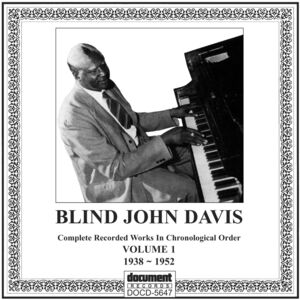Show results for
Explore
In Stock
Artists
Actors
Authors
Format
Theme
Category
Genre
Rated
Label
Specialty
Decades
Size
Color
Deals
- Blu-ray Outlet
- New Release 4K
- New Release Blu-ray
- New Release DVD
- New Release Gifts
- New Release Music
- New Release Vinyl
- Top Seller 4K
- Top Seller Blu ray
- Top Seller DVD
- Top Seller Vinyl
- top sellers all movies
- top sellers all music
- Top Selling Gifts
- TV Outlet
- Top Seller Music
- DVD Outlet
- In Stock Outlet
- Music Outlet

Complete Recorded Works Vol. 1 (1938-1952)
- Format: CD
- Release Date: 01/04/2022

Complete Recorded Works Vol. 1 (1938-1952)
- Artist: John Blind Davis
- Label: Document
- Genre: Blues
- UPC: 714298564723
Product Notes
Although Blind John Davis was an active session pianist in the 1930s and 1940s, working with artists like Jazz Gillum, Casey Bill Weldon, Memphis Minnie, and was an architect of the Chicago blues style through his work with Big Bill Broonzy and Sonny Boy Williamson, Chicago native John Henry Davis, he remained relatively unknown in the U.S. throughout his career. Davis was a solidly professional player, and his approach embraced nearly all aspects of the American piano styles, from blues and jazz to straight pop and R&B, always with a bright, almost leisurely, sound. This collection from Document Records gathers up some of his early sides as a bandleader (his later recordings were mostly done in Europe, where he maintained a large and loyal following), and they show both his versatility and his remarkable ability to make everything sound offhand, comfortable, and slightly jazzy traits that figured in his mature style, which could easily be termed as lounge blues. Highlights here include the explosive yet controlled "Anna Lou Breakdown", the measured and gentle vocal on "No Mail Today" and the soaring and gliding "Magic Carpet". Davis was seldom flashy, so it is easy to miss the subtle artistry he brought to everything he played, and he remains one of the most unsung of America's blues-based piano greats. He is best known for his work with others but is reputed to have been a little disdainful of the blues. This wouldn't be surprising of an artist who was clearly versatile, even fairly eclectic, and who seems to have had a broad musical education (if not necessarily a formal one). He didn't disdain blues as material for his own records, although it is true that he may have been responding to the dictates of fashion rather than his own predilection


